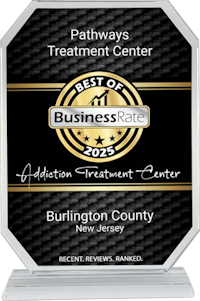Group Therapy for Addiction in Burlington, New Jersey
Our group therapy sessions foster community and peer connection. Sharing experiences in a structured, therapist-led setting builds solidarity, support, and real‑world skills to reinforce recovery. Start group therapy for addiction with us today!
Group therapy can be a powerful tool in addiction treatment, providing individuals with a supportive and understanding environment to address their struggles. It can also aid in relapse prevention by helping individuals develop coping skills and build a network of support. In New Jersey, there are various options available for those seeking group therapy as part of their recovery journey. Group therapy fosters a small therapeutic community, where members can share experiences and support each other.
Group Therapy for Addiction
Understanding Group Therapy for Addiction
Group therapy plays a vital role in substance abuse treatment, complementing individual therapy sessions. It provides individuals with a safe space to connect with others facing similar challenges, offering valuable peer support. Through sharing experiences, individuals not only gain support and understanding, but also learn from each other’s journeys.
Group therapy sessions are often led by trained therapists who facilitate discussions and activities aimed at promoting self-reflection and personal growth. These sessions can vary in structure, from topic-focused discussions to exercises that encourage teamwork and collaboration.
The Role of Group Therapy in Addiction Treatment
Group therapy serves as a platform where individuals can develop essential skills for recovery. It offers a space for individuals to explore their emotions, thoughts, and behaviors in a non-judgmental environment. Additionally, group therapy encourages open communication and empathy amongst participants, reducing feelings of isolation and shame often associated with recovery.
The mental health support group therapy can provide can’t be understated. This format provides a unique opportunity for individuals to practice interpersonal skills and receive feedback from their peers. This social learning aspect can be particularly beneficial for those who struggle with forming healthy relationships or communicating effectively.
Group Therapy for Addiction
The Benefits of Group Therapy for Addiction
Engaging in group therapy can have a profound impact on an individual’s recovery journey. Here are some key benefits that group members may experience (and provide) throughout the process:
Social learning in group therapy allows participants to learn from each other’s experiences, enhancing their recovery process and providing wonderful insight. Engaging in discussions, sharing personal stories, and providing feedback to others in a group setting can enhance interpersonal relationships and foster a sense of community among participants.
Group therapy provides a space where individuals can express their emotions freely and receive support from others who can relate to their experiences. Feeling understood and validated by peers fosters empathy, which can be incredibly empowering and healing.
Another significant benefit of group therapy is the aspect of peer accountability and motivation. Goal setting is an important aspect of peer accountability, as it helps members stay focused and committed. Being part of a group where members hold each other accountable for their actions and progress can increase individual commitment to recovery goals. The encouragement and support from peers can serve as a powerful motivator in overcoming challenges and staying on track towards sobriety.

Group Therapy for Addiction
Different Types of Group Therapy for Addiction
There are various types of group therapy tailored to meet the diverse needs of individuals in treatment for addiction. Psychoeducational groups focus on educating participants about addiction and recovery. Here are two common types:
Cognitive behavioral groups are centered around identifying and challenging negative thought patterns and behaviors associated with addiction. They have a focus on the principles featured in cognitive-behavioral therapy (CBT), which is frequently used to help treat addiction. Participants learn to replace destructive habits with healthier alternatives, fostering long-term recovery.
These groups often involve structured exercises and discussions that help individuals recognize triggers that may lead to relapse. By understanding the connection between thoughts, beliefs, and behaviors, participants can develop healthier coping skills and break free from the cycle of addiction.
Skills Development Groups provide individuals with practical tools and techniques to manage cravings, cope with stress, and improve communication skills. These groups aim to equip participants with the necessary skills for a successful recovery journey.
In addition to traditional therapy approaches, Skills Development Groups may incorporate mindfulness practices, role-playing exercises, and goal-setting activities. By honing these skills in a supportive group setting, individuals can enhance their self-awareness and self-efficacy, empowering them to navigate challenges and temptations in their recovery process.

Group Therapy for Addiction
How to Choose the Right Group for Group Therapy
Choosing the right group therapy can significantly impact the effectiveness of treatment and recovery. Treatment goals should align with the chosen group therapy to maximize the benefits of the sessions. It offers a unique opportunity for individuals to connect with others facing similar challenges, providing a sense of community and support that can be instrumental in the recovery process. When considering different group therapy options, it’s essential to evaluate various factors to ensure you find the best fit for your needs.
One crucial factor to consider is the specific addiction you are seeking treatment for. Different group therapy sessions center around learning life skills, varying types of addiction, gambling, anger management, or eating disorders. It’s essential to choose a group that aligns with your specific struggles to ensure the discussions and support provided are relevant to your journey towards recovery.
Important factors to consider include:
- The specific addiction the group addresses
- The format of the group therapy (in-person, online, etc.)
- The size of the group and the facilitator-to-participant ratio
- The duration and frequency of the sessions
It’s also important to consider the size of the group and the facilitator-to-participant ratio. A smaller group size may allow for more personalized attention and deeper connections, while larger groups can offer a broader range of perspectives and experiences.
To ensure the group therapy aligns with your needs, ask the following questions:
- What is the structure and focus of the therapy sessions?
- What qualifications and experience does the facilitator have?
- Are there any specific rules or requirements for participation?
- Is there a process for addressing conflicts that may arise within the group?
It’s essential to choose a group therapy format that fits into your lifestyle and provides the level of support you need to navigate the challenges of addiction recovery.
Group Therapy for Addiction
What to Expect in a Group Therapy Session
Each group therapy session follows a structured format designed to promote open discussion and personal growth. Group therapy sessions often include various therapeutic techniques to facilitate these goals.
Structure of a Typical Session
Sessions usually start with a check-in, where participants have an opportunity to share how they are feeling and any challenges they may be experiencing. This initial sharing sets the tone for the session and allows participants to establish trust and rapport with one another. The facilitator, a trained professional who guides the session, may introduce a topic or theme for discussion, allowing participants to share their thoughts and experiences.
As the session progresses, group members are encouraged to actively listen to one another, offering support and validation. This sense of connection and understanding can be incredibly powerful, as it helps individuals realize that they are not alone in their struggles. Group therapy sessions often include various therapeutic techniques (such as role-playing) to facilitate deeper exploration and self-expression.
The session may conclude with a closing ritual, reflection, or task for the next session. This helps participants integrate what they have learned and apply it to their daily lives. Group therapy is not a quick fix, but rather a journey of self-discovery and growth that requires commitment and active participation.
Group Therapy Etiquette and Rules
To ensure a safe and productive environment, group therapy sessions often have specific rules and guidelines. These rules are designed to create a respectful and supportive atmosphere where everyone feels heard and valued. Some common group therapy etiquette includes maintaining confidentiality, respecting others’ opinions, and allowing everyone an opportunity to speak.
Participants are encouraged to practice active listening, which involves fully focusing on what others are saying without interrupting or judging. This fosters a sense of empathy and understanding within the group. It is important to remember that everyone’s journey is unique, and while participants may share similar experiences, each person’s perspective is valid and deserving of respect.
Group Therapy for Addiction
Heal from Addiction with Group Therapy at Pathways Treatment Center
Group therapy is a transformative experience that can empower individuals to overcome obstacles, develop healthy coping mechanisms, and build meaningful connections. It provides a space where individuals can share their stories, learn from one another, and receive support and encouragement.
If you’re ready to begin your journey to recovery, you’ll find support at Pathways Treatment Center. We feature group therapy, individual therapy, and other forms of support to help you on your path. Contact us today to learn more.




